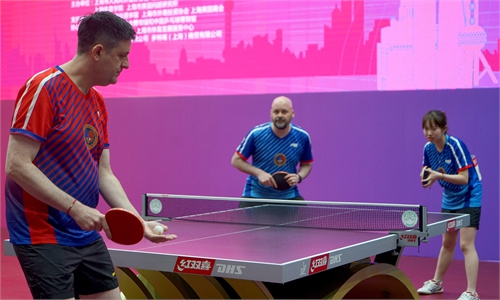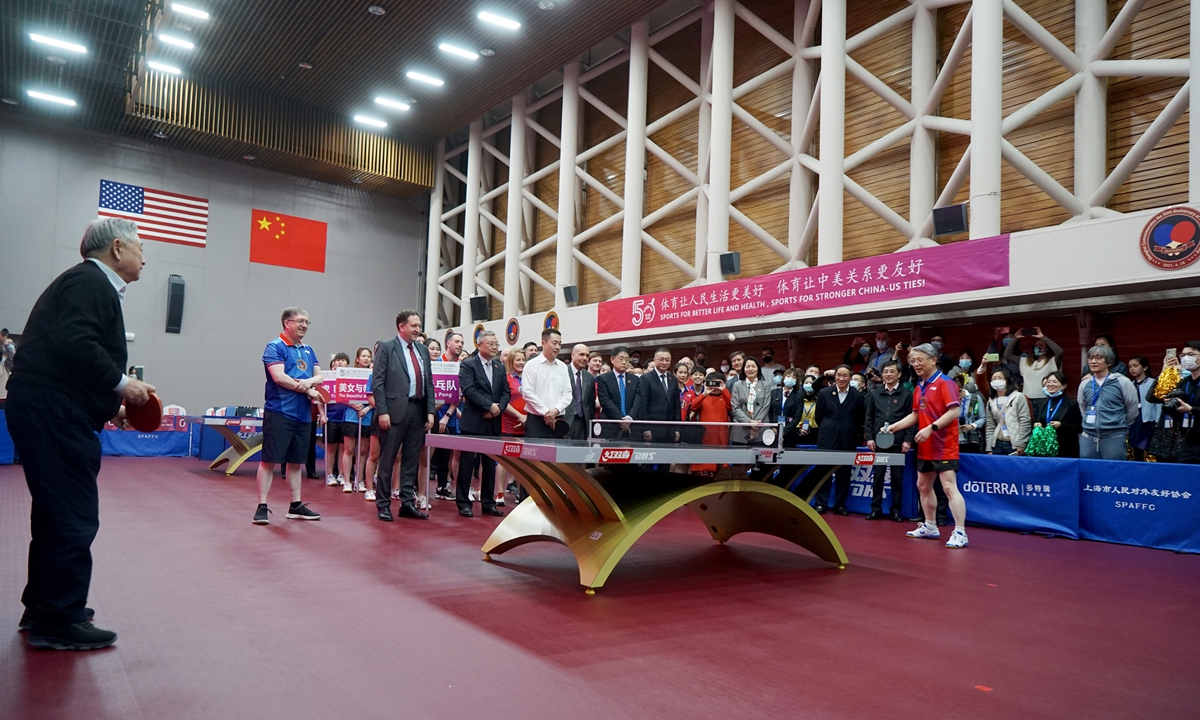
Xu Yinsheng (left), honorary president of the International Table Tennis Federation (ITTF), plays table tennis with Sha Hailin, chairman of the Shanghai People's Association for Friendship with Foreign Countries, at the Champion Hall of the International Table Tennis Federation Museum and China Table Tennis Museum in Shanghai on Saturday, where the commemorative event took place. Photo: Chen Xia/GT
Editor's Note:
On the commemoration of the 50th anniversary of the ping-pong diplomacy, Chinese and US veteran table tennis players recalled the memories of the visit by US table tennis players to China in 1971 and looked back to how a bouncing ball helped embark in a historical thaw among two powers that had almost zero contact during the Cold War.
Connie Sweeris, Dell Sweeris and Zheng Minzhi, table tennis champions from both US and China who participated in such an astonishing diplomatic games and exchanges in 1971 and 1972, shared details about the historic visit and their thoughts on China-US relations with the Global Times reporters Hu Yuwei and Huang Lanlan.
After the 1971 World Table Tennis Championships in Nagoya, Japan, the US ping-pong team became the first American delegation to visit the People's Republic of China by invitation. The Chinese team paid a return visit the following year. The mutual visits broke the ice built in two decades of estranged China-US relations and eventually led to the normalization of bilateral ties.
Fifty years on, those who were witnesses still cherish the friendship formed then, with hope that the consensus and legacy of the ping-pong diplomacy can still throw light over current tensions in China-US relations.
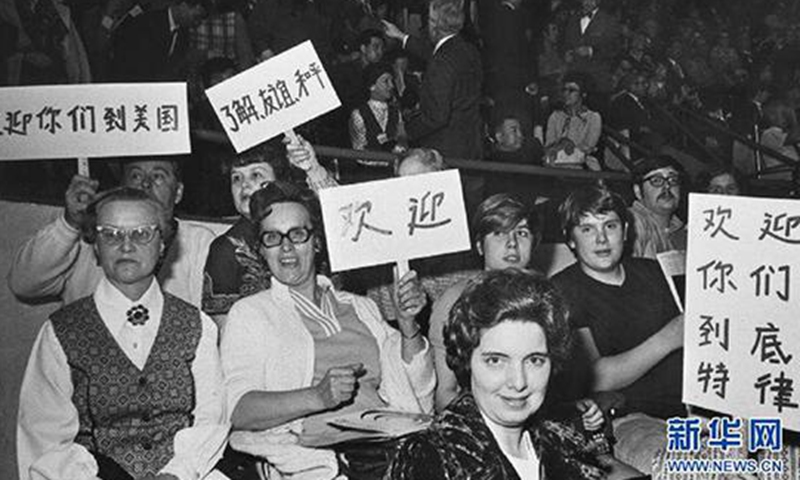
Detroit spectators watch a game between Chinese and US athletes, holding placards written in Chinese characters to welcome Chinese table tennis players in April 1972. File photo: Xinhua
A legacy still valuable today
Connie Sweeris, the 23-year-old US table tennis champion at the time, did not realize how her 1971 trip to China would help break the ice between the two countries. A train took Sweeris and her 14 teammates from Hong Kong to Guangzhou to embark on their weeklong tour around China, visiting landmarks and meeting with then Chinese premier, Zhou Enlai.
Recalling her historical trip to Beijing and Shanghai, Connie Sweeris was first impressed with the warm reception from the Chinese, the black and blue dressing style and many statues of Chairman Mao.
"Premier Zhou asked Graham Steenhoven, then president of the United States Table Tennis Association (USTTA], if he had any criticism about the trip so far and he said yes. The whole audience fell silent, and we thought, no, what is he going to say? He said: 'you feed us too much' and then the whole audience laughed because we were given food from every city that we went to in every place that we visited, a lot of times. They would have 8 to 10 course banquet meals for us to eat," Connie Sweeris told the Global Times.
Before 1971, Connie was the US women's singles national champion as well as women's doubles and mixed doubles champion. But before Nagoya, she hadn't seen or played with any Chinese table tennis player.
Upon her departure, Connie was full of apprehension about her destination and had no clue what a Communist country really meant but her concerns were soon cleared up by China's hospitality upon arrival.
Remembering the swift 8-day trip in China, Connie concluded that it is "a legacy to her whole career and her family."
Connie did not have a clue about the importance of this milestone trip for the diplomatic relations until she got home and saw worldwide headlines announcing that Chinese friendly greetings brought them closer to the US and it was a way of breaking the ice between the two countries.
The friendliness of Chinese deeply impressed Connie. "They seem to be very curious about us and very friendly. A lot of times, we would just use motions or gestures to communicate with each other," said Connie, stressing that they wished they had more interpreters there to learn more about China and its culture.
Playing with Chinese table tennis players who were mostly the top athletes in the world made Connie excited. The friendly match in Beijing, with an audience of 18,000, was impressive. It was an unprecedented experience for Connie because they "would have been lucky enough in the US to have 200 or 300 people watching a tournament or an exhibition of table tennis."
The trip to China made Connie a star. She did numerous interviews for media and her phone kept ringing because everybody wanted to learn about her experience in China.
The media spotlight was felt even by Dell Sweeris, Connie's husband, who was also a top American table tennis player.
"When Connie got back to the US, she was really famous after she got to the airport. Though it was pretty late at night, there were still two or three hundreds of people who had gathered there to see Connie coming back," Dell told the Global Times.
"The interesting thing is that I was a top American player though I did not go to Japan or China. But you are not necessarily famous in the US for being a table tennis player like in China and people would ask Connie if she wanted to come to speak to their organization and a lot of them did not know that I even play table tennis. It was kind of interesting concept at that time," said Dell.
Dell was part of the US team that hosted the Chinese delegation back in the US in 1972 and had a chance to play with some of the world champions, like Zhuang Zedong and Zheng Minzhi. He can still recall the names very clearly nowadays.
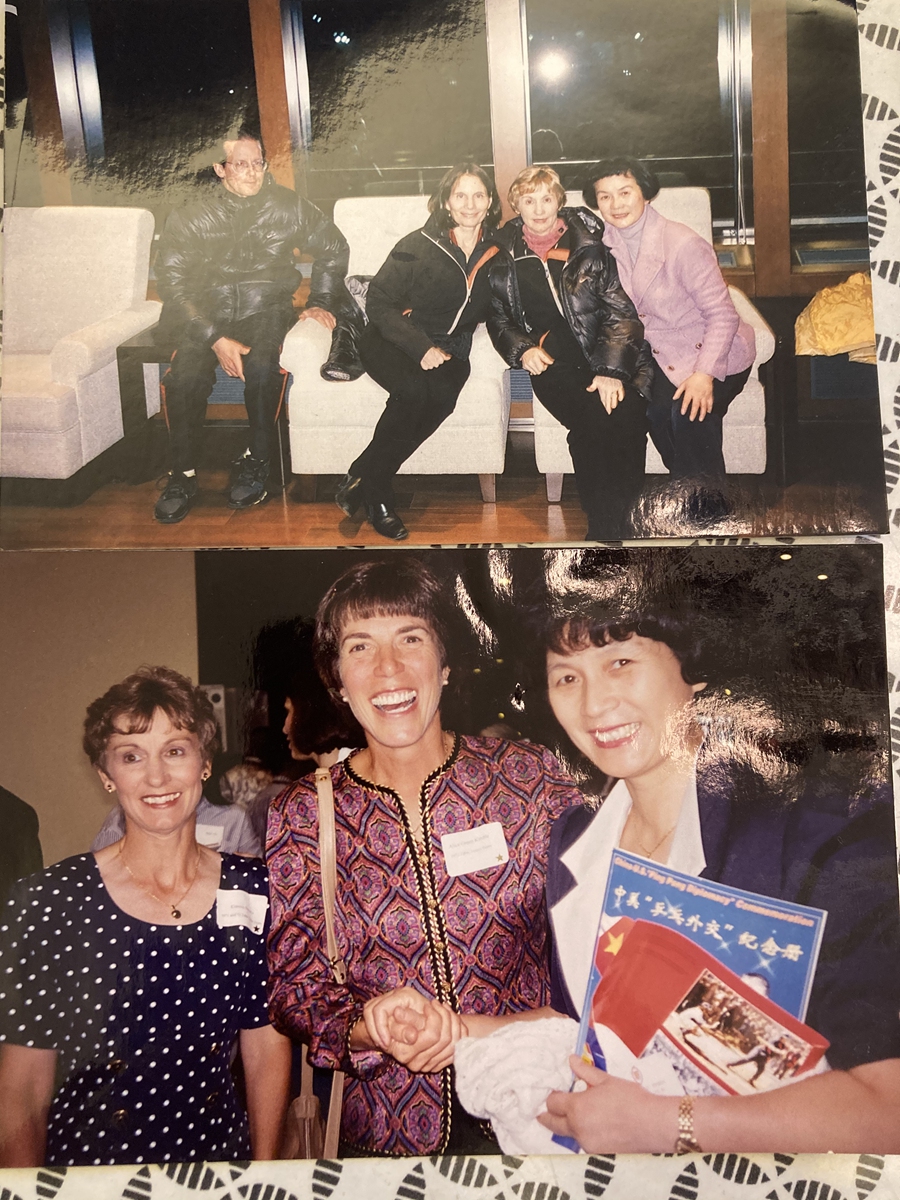
Photos of Zheng Minzhi (far right) and Connie Sweeris (first left in the second pic) who met at two different anniversaries of ping-pong diplomacy Photo: Courtesy of Zheng
Zheng Minzhi shows a historical reunion photo during a video call with Connie Sweeris and Dell Sweeris. Photo: Chen Xia/GT
On a video call commemorating the 50th anniversary of their icebreaking exchange, the US couple and Zheng, a member of the female Chinese table tennis delegation to the US in April 1972, excitedly reminisced about the days they spent together in both countries during the remarkable trips, from President Nixon's and Premier Zhou Enlai's greetings, to a series of friendly matches, and visits to Disneyland, the Forbidden City, sausage and Peking duck.
"Do you still remember the song...about 'the deer and the antelope?'" When Dell mentioned the folk song, Home on the Range, that the Chinese delegation learned to sing during its US trip, Zheng immediately hummed together with the couple. The familiar melody brought them back to the beautiful memories and laughter from half a century ago.
They talked about their current life, hobbies and grandchildren. Zheng invited the couple to visit China again after the COVID-19 pandemic. "We're hoping that our friendship can continue with another visit," the couple replied.
Connie and Dell highly valued the need to commemorate this historic milestone on how diplomatic relationship was normalized between the US and China by overcoming challenges, which can educate the current and future generations about what initiated a connection amid ideological differences.
"People-to-people exchanges can certainly break down those barriers and bring understanding and cooperation and connect us again to get us back on the road and have some better diplomatic ties," Connie told the Global Times.
The commemoration can keep the legacy of ping-pong diplomacy alive and show the new generation the history of how the two countries broke the ice and promoted their relation, she said.
Connie and Dell have been in charge of regular sports exchanges between China and the US in addition to coordinating the official relations between table tennis associations of two countries.
They have participated in previous anniversary commemorations of the normalization of relations between China and the US. They went on three different tours to China in 1997, 2006 and 2011 to celebrate the reunion without the constraint of politics.
They have been looking forward to the 50th anniversary celebrations but unfortunately they got canceled due to the COVID-19 pandemic.
After hearing rumors by Western politicians to boycott the Beijing 2022 Winter Olympic Games for political reasons, Dell and Connie felt disappointed and said this is unacceptable.
"This sometimes hurts the athletes more than what it is accomplished through a boycott and those who still compete are going to miss out on that. Whether it helps the politics? I'll doubt if it really does," said Dell. 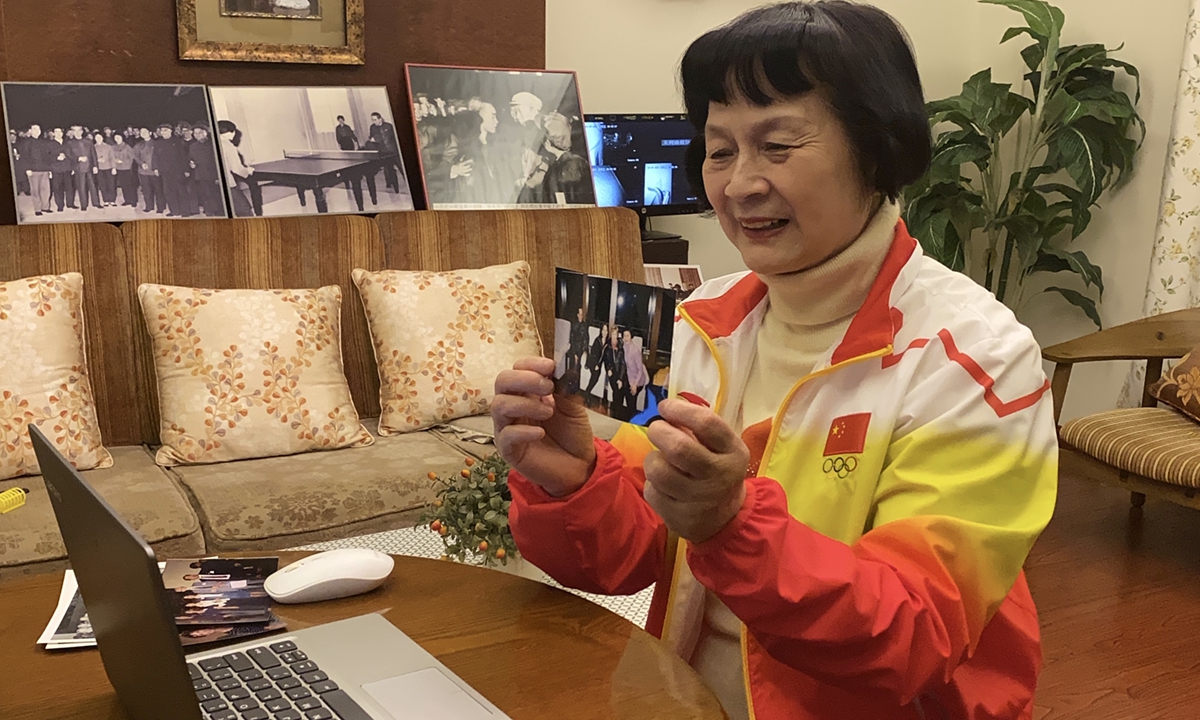
Appreciating the wisdom and foresight'
Former Chinese table tennis gold medalist, Zheng Minzhi, now 76, has been keeping a disposable camera with great care for 50 years. The camera was a gift Zheng received in April 1972, when she visited the US for the first time with the Chinese table tennis delegation.
With a prolonged lack of contact, the two peoples were quite curious about each other in the early 1970s. Zheng recalled she felt "both excited and nervous" about her visit to the US.
"I learned from my parents that America was very rich, strong and modern. I had no idea how its people would think of us. Would they be hostile to us Chinese? Would they look down upon us?" she told the Global Times.
Zheng was soon relieved after arriving at the US, when she and her Chinese teammates were surrounded by smiles and greetings at the airport. Zheng said she was impressed by the sincerity and hospitality that US table tennis players and ordinary Americans showed to them during the trip.
She recalled that when the Chinese players had an exhibition game at a car factory in the US, the workers gave them a warm welcome. "They gave us a hug, shook hands with us and said 'welcome, welcome!" Zheng told the Global Times. "We didn't speak each other's languages, but I could feel their friendliness through their facial expressions and body language."
The ping-pong diplomacy creatively paved a way for the normalization of the China-US relations in those hard years filled with ideological confrontations. Witnessing and experiencing the milestone event, Zheng said she appreciates the wisdom and foresight of leaders of the two countries who broke the ice in China-US relations in a smart, flexible way.
"The people-to-people exchanges have significance different from official government contacts; we exchanged in the name of friends," Zheng said. "As Premier Zhou Enlai always told us, 'friendship first, competition second.'"
She was impressed by what Nixon said when meeting the Chinese table tennis players at the White House Rose Garden in 1972. "He told us: 'there is a winner and loser in a competition but the Chinese and American athletes, you opened the door to friendship for people of the two countries, so you are the biggest winners.'"
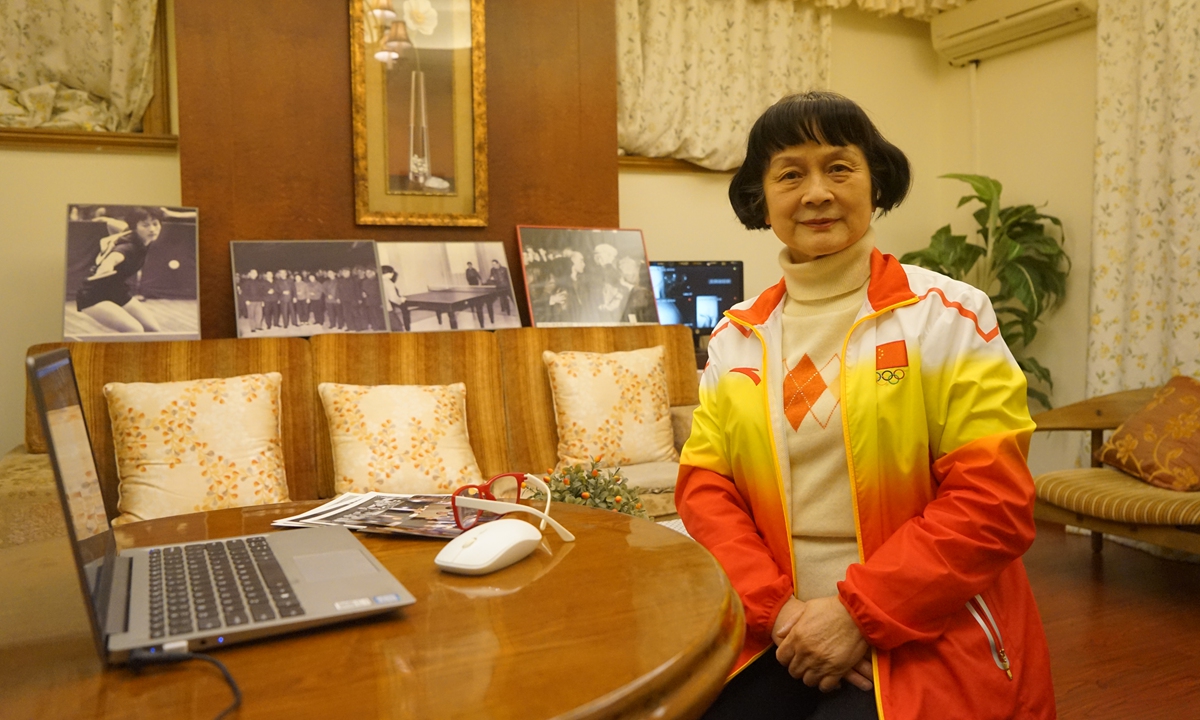
Former Chinese table tennis gold medalist Zheng Minzhi at her home Photo: Chen Xia/GT
People use the phrase "the little ball moves the big ball" to describe the ping-pong diplomacy. The table tennis teams of the two countries in those years not only fought to be champions but also shouldered the responsibility of promoting China-US relations.
Once in an interview in 1997, Zheng told The New York Times reporter that the friendly matches she played with American players in the early 1970s were "unlike any other games" she'd ever played. "I knew I was not only there to play, but more important, to achieve what cannot be achieved through proper diplomatic channels," she said.
Even today, non-governmental exchanges in various areas including sports, art and technology can still play an important role in smoothing the ties between the world's two largest economies, Zheng noted.
"There may be some fluctuations in China-US relations, but I believe that people-to-people exchanges will continue," she told the Global Times.
"As President Xi Jinping said in 2017, there are 'a thousand reasons to make China-US relations work and no reason to break it.'"
Zhang Yutong contributed to the story


